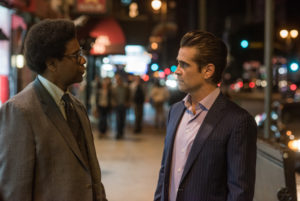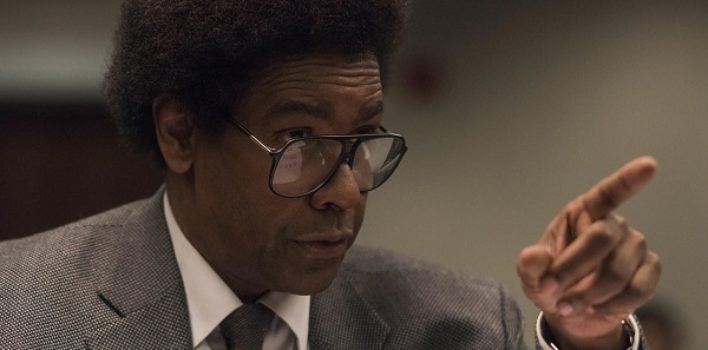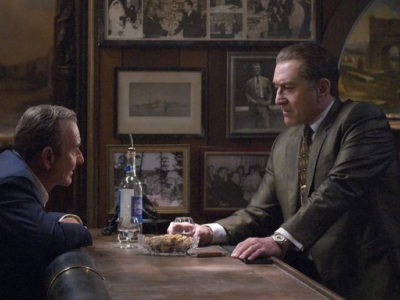Review| Roman J. Israel, Esq.
 Unsurprisingly, Denzel Washington gives an excellent performance in his latest film Roman J. Israel, Esq., but even though he’s following up Oscar nominated Fences, Roman J. Israel, Esq. is a subpar film that doesn’t quite pack the same punch as Washington’s usual work. On the heels of the critically acclaimed Nightcrawler, Writer/Director Dan Gilroy has the makings of a great story in Roman J. Israel, Esq., but he just can’t quite put all of the pieces together, leverage the talents of his actors, or thread the needle with the themes and plot.
Unsurprisingly, Denzel Washington gives an excellent performance in his latest film Roman J. Israel, Esq., but even though he’s following up Oscar nominated Fences, Roman J. Israel, Esq. is a subpar film that doesn’t quite pack the same punch as Washington’s usual work. On the heels of the critically acclaimed Nightcrawler, Writer/Director Dan Gilroy has the makings of a great story in Roman J. Israel, Esq., but he just can’t quite put all of the pieces together, leverage the talents of his actors, or thread the needle with the themes and plot.
Washington plays ungainly, awkward Roman J. Israel Esq., a defense attorney working at a two man law firm in Los Angeles. Roman prides himself in letting his activism and convictions inform who he works with and what he works on. His partner William Henry Jackson is the more personable “face” of the firm, while Roman spends his days doing meticulous research and coming up with strategies for the case. It helps that he has an uncanny ability to memorize information and regurgitate facts and data. It’s not incredibly clear throughout the film, but it seems like he might fall somewhere on the autism spectrum based on his behavior.
Roman gets his drive from his ideals. He is uncompromising about the law. Everything is black and white. This level of commitment to fighting against the corrupt aspects of the criminal justice system, especially as it relates to injustice for people of color, catches the eye of activist Maya (Carmen Ejogo). She is attracted to his unwavering commitment to his passion. Even when she asks him to come speak at one of her activist meetings and it goes awry because of Roman’s lack of tact, she isn’t turned off.
 When Roman’s partner Henry suffers a heart attack and fights for life, Roman is challenged to engage in some of the aspects of practicing law that he’s not very strong in, namely dealing with clients. “I’m tired of doing the impossible for the ungrateful,” he quips at the height of his struggle. Roman is comfortable in his routine and accepting the values that have served him well up until this point, but when he’s faced with a real crisis, the film falls short by failing to give us anything meaty to wrestle with or see any great transformation in his character.
When Roman’s partner Henry suffers a heart attack and fights for life, Roman is challenged to engage in some of the aspects of practicing law that he’s not very strong in, namely dealing with clients. “I’m tired of doing the impossible for the ungrateful,” he quips at the height of his struggle. Roman is comfortable in his routine and accepting the values that have served him well up until this point, but when he’s faced with a real crisis, the film falls short by failing to give us anything meaty to wrestle with or see any great transformation in his character.
After the arduous process of finding employment, a successful high-priced lawyer, George Pierce (Colin Farrell) offers Roman a job because of his history with William. Roman initially declines out of fear that he will compromise on his ideals, but in the end it doesn’t matter. Roman never compromises on his ideals, until he does. Things are black and white, until they aren’t. Without any great exposition, explanation, or conclusion about why Roman starts to make poor decisions and falter on his values, we’re left to wonder why he’s become disillusioned when he’s come into a great job, met a great woman, and started to be more effective in his work than he’s ever been.
 One thing the film does do well is present us with a believable character in George Pierce. Enhanced by a great performance from Farrell, Pierce isn’t demonized as the greedy lawyer who doesn’t care about people, he demonstrates that it’s possible to have influence and be effective. Roman learns from this and has an epiphany in the end that still provides some food for thought as an audience, but it’s a bumpy ride getting there.
One thing the film does do well is present us with a believable character in George Pierce. Enhanced by a great performance from Farrell, Pierce isn’t demonized as the greedy lawyer who doesn’t care about people, he demonstrates that it’s possible to have influence and be effective. Roman learns from this and has an epiphany in the end that still provides some food for thought as an audience, but it’s a bumpy ride getting there.







